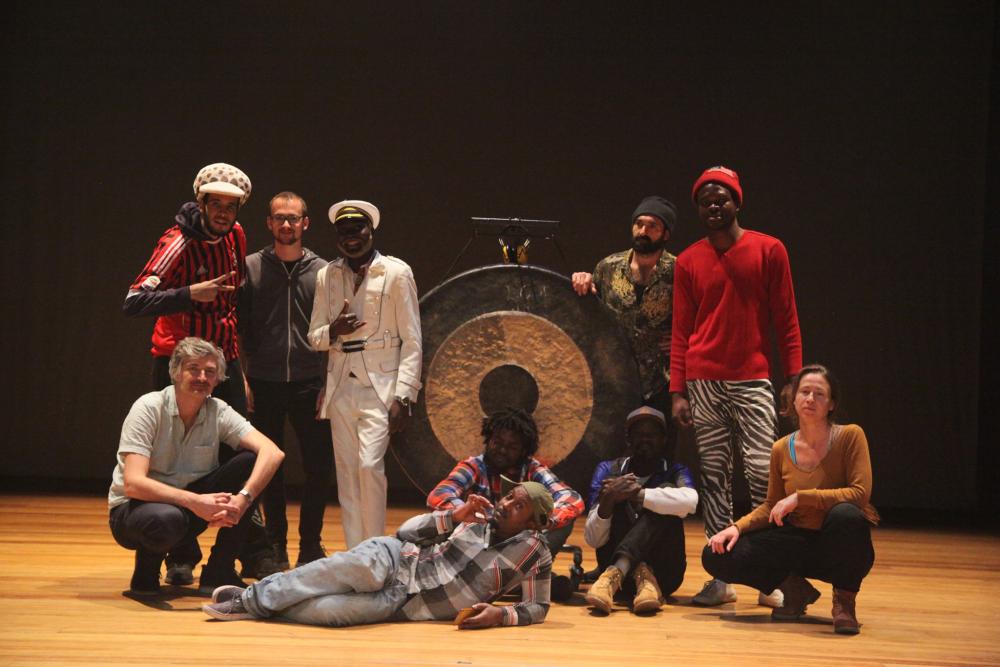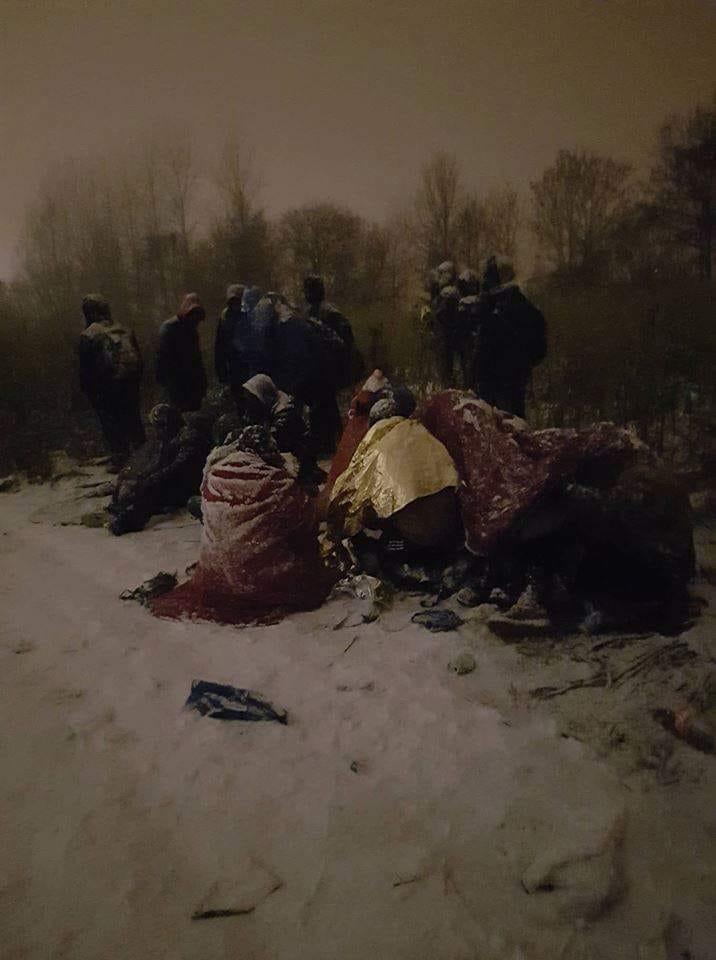a delicate balance between ON and OFF
an interview with Niko Hafkenscheid, Hedvig Biong and Pablo Castilla
One week before the première, in a conversation on this programme booklet, I asked Hedwig, Niko and Pablo what Landscape Orchestra was about. Afterwards we decided to turn our brief conversation into a written one. I sent them more or less the same question I asked them before. They sent back a wide range of thoughts and reflections, which we let come together in the following interview.
Landscape Orchestra departed from the landscapes you go through when traveling. Why did you choose to start from the idea of landscapes?
When working with topics that are constantly fed through the media such as migration, we are somehow stuck with one way of viewing or relating to this issue. We think of migrants as a collective, and we attach certain ideas and images to them. There is a certain narrative that is already strongly embedded in the viewer’s mind. Therefore we were looking for a new entrance into this theme, and the idea of landscape came up. We started with a lot of questions: is it possible to tell this story, again, differently? Is there any space left for poetry? What ethics need to be operating within us to speak about something we have no clue about? We were interested in the crossing of gazes, approaches, interpretations.
We literally tried to find common ground between us and them, with the notion of the landscape. One definition of a landscape is a romantic idealization of reality. Symbols or iconic images such as the desert, the mountain peaks, or the ocean, are part of our European cultural traditions. But do these landscapes really exist in the eyes of the people that cross it today? How can we find common ground in what we think is a universal thing but obviously isn’t. It became very clear when recording the interviews, that we relate very differently to this “idea of landscape”
One idea would be to reconstruct this romantic archetype through the words of migrants. To tell a tale that can include the epic as well as the beautiful, and the absurd. At the same time, the landscape can be regarded as a symbol for traveling.
In the end Landscape Orchestra turned out to be an attempt to reconstruct the experience of crossing territory, large extensions of land. And to measure what meaning is or isn’t attached to it. Their relation to landscape is more about logistics and making it through. Combined with our own vision on crossing territories, Landscape Orchestra has become an imaginary landscape based on fragmented memories of their journey, and the possible sublimation of it through music.
The performance is based on interviews with the artists/participants from Globe Aroma. What were these interviews about? And how do they come back in the performance?
Interviewing the participants is a great way to get to know them, to spend time together as well as to collect information and explore.
We didn’t prepare the questions in advance, we rather thought of a strategy or a general intention before each interview session. As we mentioned before, the main topic of the conversation was landscape, but we preferred to keep it open. In many occasions the focus started drifting, so we would end up talking about something completely different. And it is precisely there, in the “peripheral”, that resides the irrelevant, which is unexpected, and therefore interesting, with poetic potential.
All the texts shown in the piece are fragments of interviews with various migrants. They belong to no one in particular and are made up of fragments of everyone’s testimonies. It always feels like a privilege to be able to ask questions, especially about situations on which the media have built a dominant narrative. The interviews lead us to break this dominance, and reveal a multifaceted complexity, where every individuals’ unique position stands against a generally accepted perspective.
A landscape can have many forms, from a natural to an industrial or urban one, but it can also be seen with a more conceptual approach. Which landscapes will we be traveling through during the performance?
There is a concrete physical landscape is presented on stage : the scenography itself.
The presence of the participants and the instruments, but also the theater lighting depict different situations that can be linked to the journey.
There is an imaginary, or mental landscape as the texts deliver information and the music affects the meaning of these texts. But the landscape remains open, as an ongoing construction, and can transform in the imagination of the spectator. This process of transformation demands alertness from the spectator, regarding the parameters presented on stage: text, music, actions.
The balance between the parameters invites for a game of completing unfulfilled situations and meaning.
It’s for the audience to engage in making sense between the meaningful and the meaningless, what is presence or absence.
The title of the piece also mentions an orchestra. An orchestra refers to a multitude of instruments playing a piece of music together, most of the time ‘in harmony’. How do you relate the concept of the orchestra to the piece?
The participants are not professional musicians, and though we have instructed them musically, we haven’t aimed for perfection as a way of questioning the “rules” of academic music. Playing music was something quite new for the group: most of them started playing only in the last months and one of the participants even told us that music was forbidden in his village.
On stage there are a number of music instruments. The instruments refer to European musical tradition: tuba, piano, trumpet, violoncello… as a metaphor for a new world in which they arrive, and perhaps the necessity to adapt and relate to new rules.
Also, the instruments become a way to access each performer’s personality.
In the piece, we speak about the possibility of harmony and also about what happens when it’s lacking. When things are off tune, we attempt to vibrate together and propose a delicate balance between ON and OFF, between harmony and disharmony.
an interview with Niko Hafkenscheid, Hedvig Biong and Pablo Castilla by Eva Decaesstecker (Kaaitheater)

